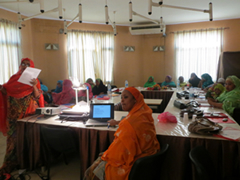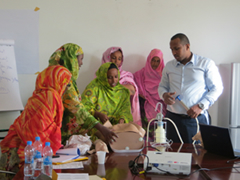- Home
- Technical Cooperation Projects
- Index of Countries
- Africa
- Djibouti
- The Project for Capacity Development of Midwives
- Project News
- Implementation of the In-Service Training for Midwives (from January 2014)
Project News
2014-01-15
Implementation of the In-Service Training for Midwives (from January 2014)
In-service training for midwives, one of the main activities of the project, has begun in January 2014. Through the preparation of the training plan, it became apparent that more than 70% of the targeted 170 midwives nationwide are assigned to health facilities in Djibouti city. As a result, five batches of training have been planned for midwives working in Djibouti city and then the training has been planned for midwives working in each rural region of Djibouti (Arta, Ali-Sabieh, de Dikhil, Obock, Tadjourah).
The first batch of training was held for 6 days starting from January 28th, 2014 at the conference room of Higher Institute of Health Sciences (ISSS) which is the basic midwifery education institute, and 24 midwives from various health facilities in Djibouti city participated. Lectures were conducted by facilitators who joined TOT (Training of Trainers). In addition, a third-country expert from Morocco, who supported TOT, was invited again, conducted a lecture of antenatal care and provided support for other facilitators.
Since the participants were from different health facilities, this in-service training seems to have become precious opportunity to recognize the situation of each facility. For example, during the lecture of emergency referral, enthusiastic discussion continued regarding the issue of inappropriate referral and counter referral cases among health facilities. The participants themselves showed an intention of having periodical opportunity to exchange opinions after the training.
After finishing five batches of the training in Djibouti city, the project started in-service training in rural areas in June 2014. In district hospitals of rural areas, specialists such as obstetricians and gynecologists are not usually allocated and operating room has been closed due to shortage of human resources and equipment. Thus, Djibouti faces serious obstetric challenges that all cases except for normal deliveries must be referred to the maternal hospitals in Djibouti city. Because some cases are not diagnosed appropriately and others are not referred timely to the referral hospitals, not a few mothers' and neonatal lives which can be saved are in jeopardy.
The project has been providing in-service trainings of Emergency Obstetric and Neonatal Care (EmONC) based on the standard programs to all midwives nationwide in Djibouti. However, considering the fact that midwives in rural areas have few opportunity to learn actual EmONC skills, the project reorganized the program for the midwives of rural area to be able to practice skills such as vacuum extractions and the removal of retained products as much as they could during the training.
The first batch of in-service training in rural area was implemented in Arta district. Six midwives participated and the training took place under the delightful atmosphere owing to the merits of small number of participants and participation of the midwife supervisor as a co-facilitator for the whole duration of the training. In the practice sessions, many participants seemed to have difficulties to acquire the skills not familiar to them before the training, but it became a valuable opportunity for them to acquire new techniques.
The project will carry out in-service training in other regions while providing the follow-up for the trainers and updating the training tools in order to improve the its quality.


- About JICA
- News & Features
- Countries & Regions
- Our Work
- Thematic Issues
- Types of Assistance
- Partnerships with Other Development Partners
- Climate Change / Environmental and Social Considerations
- Evaluations
- Compliance and Anti-corruption
- Science and Technology Cooperation on Global Issues
- Research
- JICA Development Studies Program / JICA Chair
- Support for the Acceptance of Foreign HRs / Multicultural and Inclusive Community
- Publications
- Investor Relations
